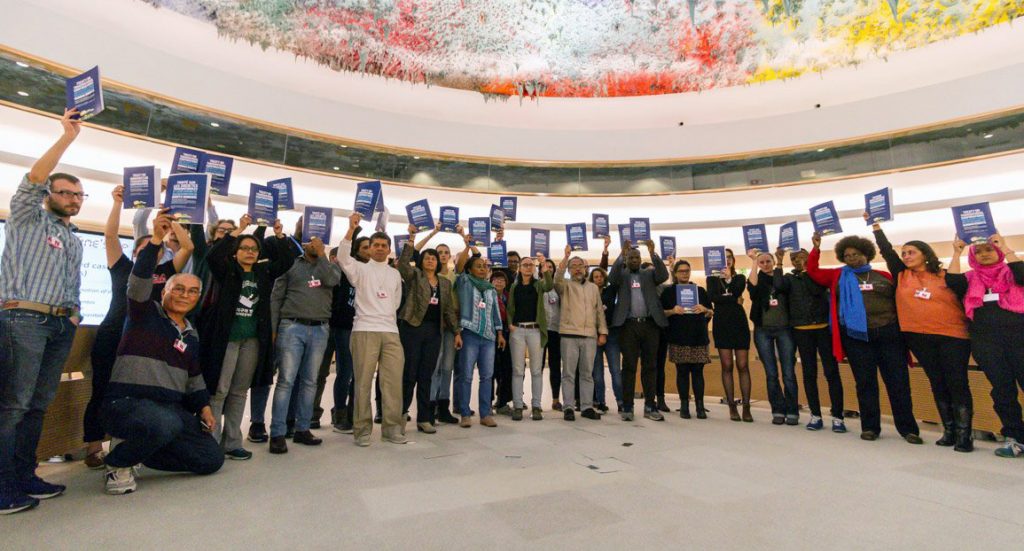Anne van Schaik, Friends of the Earth Europe’s corporate accountability campaigner, attended the recent week of negotiations in Geneva for a UN Treaty on business and human rights, and writes here about the outcomes and the unhelpful role of the European Union.
From 23 to 27 October, historic negotiations took place on the elements for a UN Treaty on business in relation to human rights. Over 200 civil society organizations and activists from 80 countries as well as a record presence of 101 member states participated in the process.
As the world counts over 3000 trade and investment treaties which gives rights for investors, a treaty by which corporations can be held accountable for violations of environmental or human rights is long overdue.
Unfortunately, the EU did not play a constructive role during this week. They objected to the Program of Work on the first day, by raising two additional demands. After protests by European civil society as well as objections by other States, the EU chose to no longer obstruct the start of the process.
In just one week’s time, experts, states and civil society discussed the core parts of the proposal for a draft text, put forward by the Chair-Rapporteur Ecuador, which encompassed general framework, scope, general obligations, preventive measures, legal liability, access to justice, jurisdiction, international cooperation and implementation and monitoring. All these discussions are recorded.
During the debates, many states, including the EU, intervened with questions and opinion statements
Simultaneously, the Campaign to Dismantle Corporate Power organised actions and debates outside the UN building, and several organisations mobilised on social media to enforce the call to end corporate impunity.
“We want the right to know, we want the right to say no!” @vitservetnik speaking at #UNOG to demand #BindingTreaty to #StopCorporateAbuse pic.twitter.com/07wdwEHWym
— Friends of the Earth (@FoEint) October 25, 2017
Towards the end of the negotiations, the EU yet again hindered the UN Treaty process from moving forward, by objecting to a fourth session of the Intergovernmental Working Group in 2018 and proposing to have only consultations on the process, whereas civil society and many states stated that a fourth session should and will be realised in 2018.
We leave @UNGeneva with sense of victory, we worked hard, and more is to come. But the time for a #BindingTreaty is here. Well done people! pic.twitter.com/SZelq2QQAw
— Dismantle Corp Power (@StopTNCimpunity) October 27, 2017
The lack of ambition on the part of the EU is alarming- and it stands in stark contradiction to the EU’s ambition in advancing the Multilateral Investment Court (MIC), where it gathers more than 60 countries to explain its proposals in workshops and presentations around the world and estimates that it would contribute € 5.4 million annually to the operation of the new corporate court. Why not invest this time, energy and money in the establishment of a UN Treaty?
The behaviour of the EU in Geneva was unacceptable. Already in 2016, the European Council of foreign affairs acknowledged the lack of access to justice by affected people. We demand our governments lead the way to a Treaty which has the possibility to end the current corporate impunity – which exists because of the legislatory gap between companies operating internationally and civil law being established at national level.
Affected people, civil society and activists from the South demand this treaty become a reality. Any attempt by the EU or states to block or derail this process denying the right of affected people to justice will go down in history.







